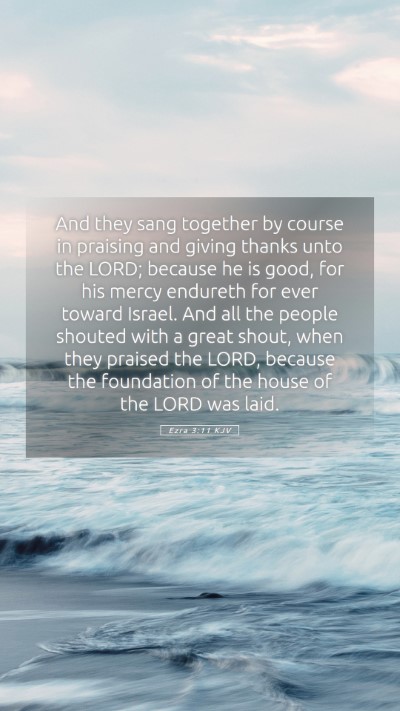Old Testament
Genesis Exodus Leviticus Numbers Deuteronomy Joshua Judges Ruth 1 Samuel 2 Samuel 1 Kings 2 Kings 1 Chronicles 2 Chronicles Ezra Nehemiah Esther Job Psalms Proverbs Ecclesiastes Song of Solomon Isaiah Jeremiah Lamentations Ezekiel Daniel Hosea Joel Amos Obadiah Jonah Micah Nahum Habakkuk Zephaniah Haggai Zechariah MalachiEzra 3:11 Meaning
What is the meaning of Ezra 3:11?
And they sang together by course in praising and giving thanks unto the LORD; because he is good, for his mercy endureth for ever toward Israel. And all the people shouted with a great shout, when they praised the LORD, because the foundation of the house of the LORD was laid.
Ezra 3:11 Bible Verse Meaning
Understanding Ezra 3:11
This commentary provides a deep dive into Ezra 3:11, an important verse reflecting the joy and gratitude of the Jewish people as they resumed temple worship after their return from exile. The verse states:
"And they sang together by course in praising and giving thanks unto the Lord; because He is good, for His mercy endureth forever toward Israel." (Ezra 3:11 KJV)
Verse Meaning Summary
Ezra 3:11 encapsulates a moment of profound worship and thanksgiving. It signifies the re-establishment of the temple and the return of God’s people to their spiritual roots. Here’s a closer examination of its components:
-
Corporate Worship:
The phrase "they sang together" indicates the communal effort in worship, underscoring the importance of collective gatherings in spiritual practices. Worship in unity reflects the strength of shared faith and purpose.
-
Praising the Lord:
The act of praising is central to the life of the believer. Their songs express gratitude and reverence towards God, highlighting the connection between worship and recognition of God's goodness.
-
God's Goodness:
The declaration "He is good" recalls God's character and nature. It affirms a theological truth that remains timeless: God's fundamental goodness is the basis for worship and trust.
-
Enduring Mercy:
The mention of God's "mercy endureth forever" speaks to the everlasting nature of God's mercy towards Israel, assuring the people of God's everlasting covenant and relationship with them.
Historical Context
Ezra 3:11 emerges during the period after the Babylonian exile, a time filled with hope and restoration. The Jewish people, having faced devastation, were now witnessing the fulfillment of God's promises. This historical context is vital to understanding the emotions and significance surrounding this worship.
Commentary Insights
Matthew Henry's Commentary
Matthew Henry emphasizes the importance of gratitude expressed in community worship. He notes that their singing was not just ritualistic but a heartfelt response to God's goodness. Henry suggests that this moment of praise serves as an example for believers to continually engage in worship that reflects thankfulness for God’s past and present grace.
Albert Barnes' Notes on the Bible
Albert Barnes points out that the phrase indicates a "course" or order to the singing, highlighting the structured nature of worship within the temple. He suggests that this organization underscores respect for God’s holiness and the importance of order during worship. Moreover, Barnes notes that the singing served to inspire confidence and motivation among the people as they rebuilt their spiritual lives.
Adam Clarke's Commentary
Adam Clarke elaborates that the phrase "for His mercy endureth forever" reflects a common liturgical phrase in Hebrew worship, symbolizing not only kindness and benevolence but also God’s steadfast love. Clarke asserts that such reminders of God's enduring mercy were crucial for a nation rebuilding its identity and faith after its trials.
Application to Daily Life
Ezra 3:11 provides practical implications for modern readers:
-
The Importance of Community in Worship:
This verse encourages believers to engage in communal worship as a means of expressing collective gratitude and reinforcing faith together within the community of believers.
-
Gratitude as a Spiritual Practice:
Regularly remembering and expressing thanks for God’s goodness cultivates an attitude of gratitude in life, helping individuals to focus on God’s provisions amid challenges.
-
Understanding God's Nature:
Reflecting on God's goodness and mercy allows believers to deepen their faith and fosters hope that God’s promises are unshakable.
Related Bible Cross References
- Psalm 107:1 - "O give thanks unto the Lord, for He is good: for His mercy endureth forever."
- 1 Chronicles 16:34 - "O give thanks unto the Lord; for He is good; for His mercy endureth forever."
- 2 Chronicles 5:13-14 - where the temple dedication involved singing and praises, similar to the context of Ezra 3:11.
Conclusion
Ezra 3:11 stands as a powerful reminder of the integral role of worship and gratitude in a believer's life. By examining this verse through various commentaries and applying its insights, one can gain a deeper understanding of the significance of God's enduring mercy and how this can be relevant in today’s context.
Whether through personal reflection, group discussions in bible study groups, or in-depth analysis using bible study tools, understanding Scripture like Ezra 3:11 enriches one’s spiritual journey and solidifies the faith community.


